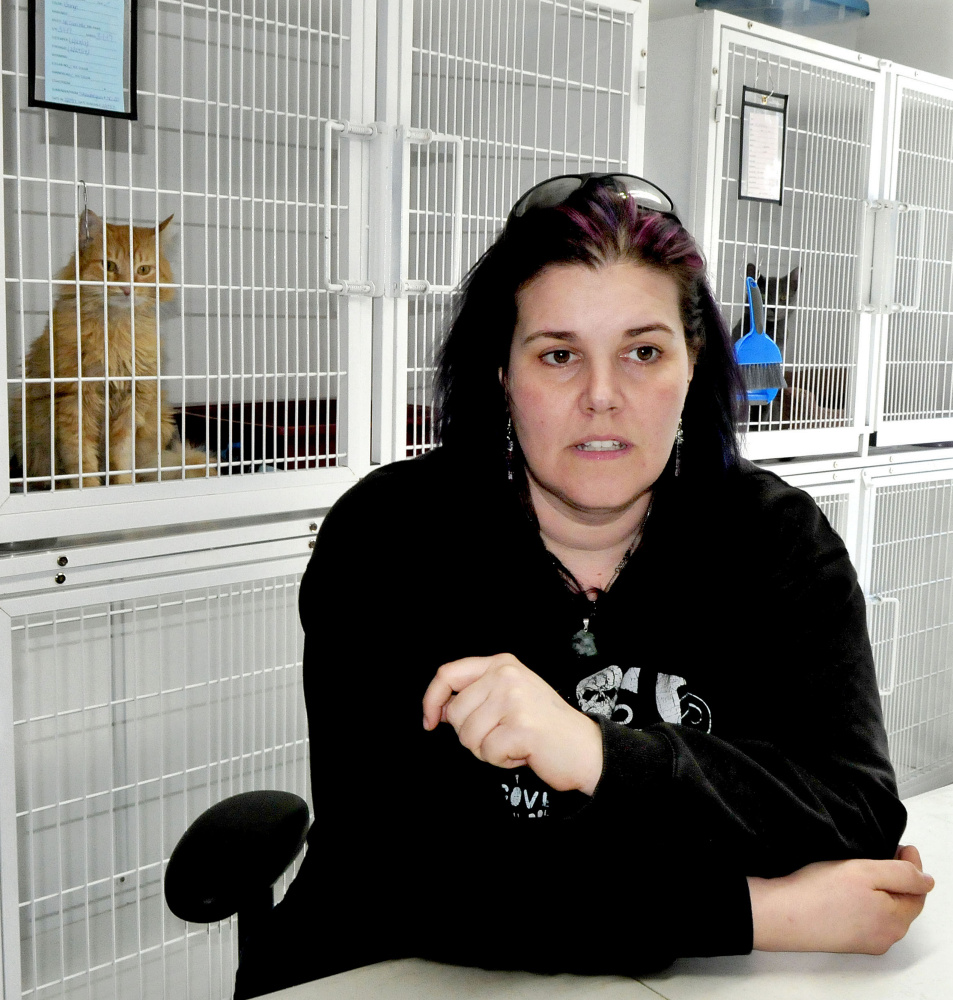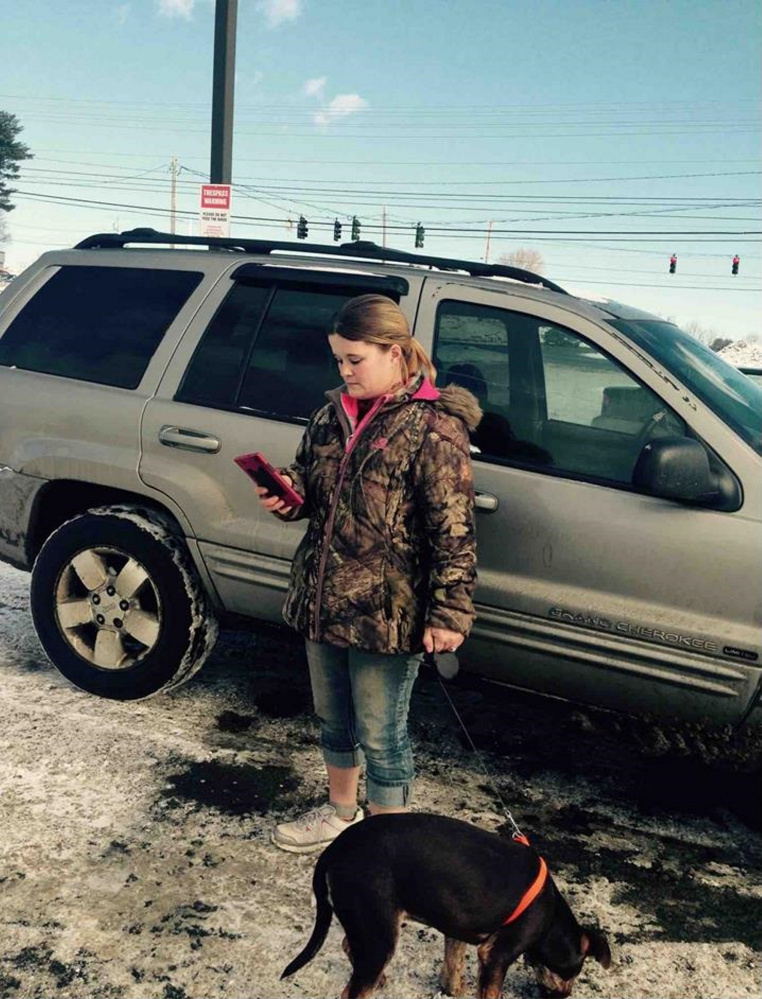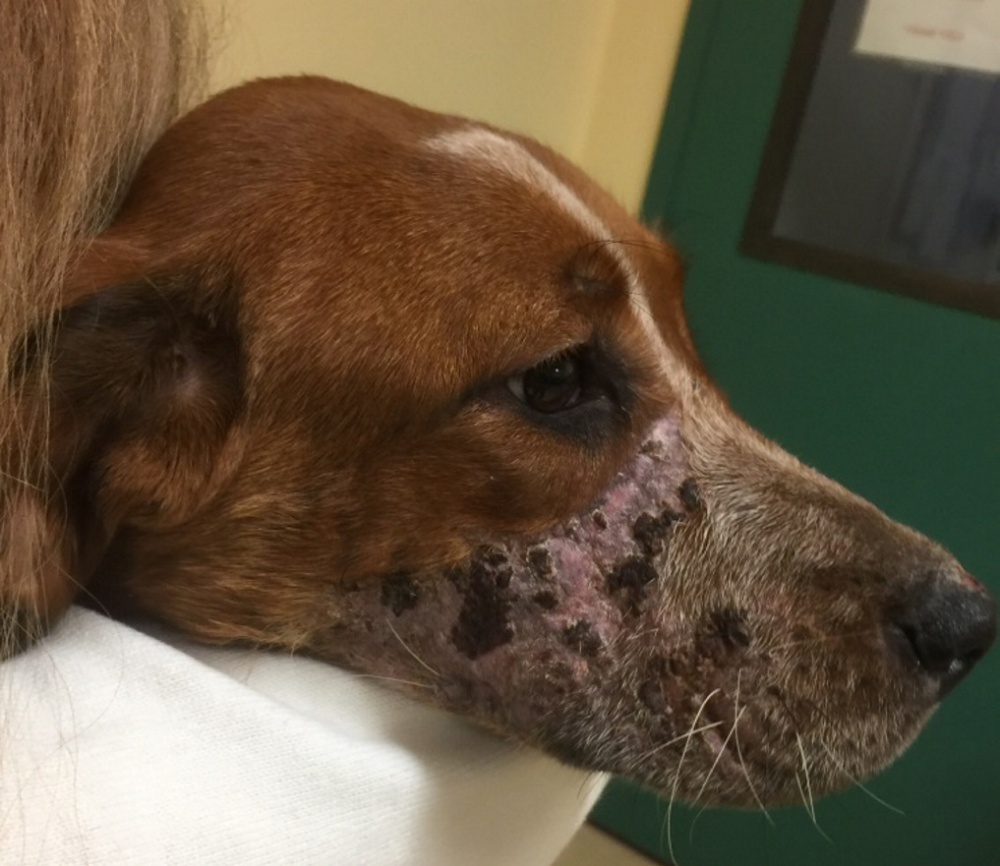SKOWHEGAN — Before walking into Nicole Bizier’s garage on March 17, Detective Katelyn Nichols hadn’t worked on an animal cruelty case.
“It was disturbing, walking into the garage and seeing dogs basically stacked in cages,” said Nichols, who works for the Skowhegan Police Department.
Authorities began investigating Bizier, 32, earlier in March, when the state Animal Welfare Program received an animal cruelty complaint for a stray dog found in Pittsfield. The state agents determined that Bizier last owned the dog, which had severe tissue damage around its mouth from wearing a muzzle for an extended period.
Agents found that Bizier was still allegedly selling dogs online, something authorities ordered her to stop doing in February, when she was charged with tampering with public records and falsifying private records.
In mid-March, state agents and Skowhegan police executed a search warrant at Bizier’s home, where they allegedly found 11 dogs in poor conditions, and arrested her on multiple charges.
At this point, it sounds like Bizier was “pet flipping,” Nichols said. Pet flipping is when someone gets an animal for free and then turns around and sells it. While Nichols said she’s never seen this type of behavior before, she suspects that it may happen more often than people realize.
Typically, those who “flip” pets are stealing them, said Brandi Hunter, vice president of public relations and communications at the American Kennel Club.
Someone will let a dog play in the yard or leave it tied up outside a store while running errands, and the dog will be stolen. The group has even heard of people stealing dogs from cars, Hunter said, though she added that not every theft is about pet flipping.
According to the club’s National Pet Theft Database, the number of stolen dogs has increased dramatically since 2008, when 71 were reported stolen. In 2015, 831 dogs were stolen.
While there are no data on dogs stolen in Maine, Natalie Messier, president of the nonprofit Maine Lost Dog Recovery, said her group received 804 reports of lost dogs in 2015 and 12 percent were unaccounted for. In 2016, the number of reports increased to 924, and 11 percent are still unaccounted for.
Messier said if people find a stray or lost dog, they must report it to the local authorities. If they keep it without doing so, that’s against the law, she said.
With this case, however, it seems that Bizier was getting the dogs for free from people who were looking to give them new homes.
Nichols said a number of possible victims have come forward, as well as a number of people who say they gave her their animals, thinking they were going to a good home.
On average, Bizier was selling the dogs for $250 to $500, Nichols said.
Bizier was charged with theft by deception, cruelty to animals and illegal operation of a pet shop. She was taken to the Somerset County Jail in East Madison, where she got out on bail for $500. Attempts to reach Bizier for comment were not successful.
ANIMALS IN SQUALID CONDITIONS
Nichols was one of the Skowhegan police officers who took part in the search of Bizier’s home.
The one-car garage, which held tools, yard equipment and toys in addition to the four adult dogs, was very cold, Nichols said, and had no form of heating. The dogs were in cages that gave them just enough room to turn around, she said, and they didn’t have water or food bowls. The cages had hay and some had dog beds, but those were “so dirty they almost looked brown,” Nichols said. The dogs were relieving themselves in their cages.
While Nichols was in the garage, another Skowhegan officer called her saying there were puppies locked in a closet.
Nichols, who has a dog herself, was shocked.
“It’s hard to believe a human being could keep animals locked up in a closet,” she said.
Inside the house where Bizier lives, which is a small single-wide trailer in Skowhegan, it smelled “like old food and animal urine,” Nichols said. There was clutter everywhere.
In the home’s only bathroom, police found four puppies in the bathtub. They had a blanket, but it was soaked in urine. There was a bowl of wet cat food and no water bowl.
“It looked like they were expected to drink from the dripping faucet,” Nichols said.
It seemed the 4-week-old puppies were not allowed to leave the tub. They acted lethargic, she said.
“Normally, puppies at 4 weeks old, they’re excited and jumping around. But these seemed exhausted,” Nichols said.
In a house closet three more puppies were found. The total space for the dogs was about 2-by-2-feet when the door was closed with a small cardboard box filled with cat litter, which they didn’t use.
The puppies slept through the transfer from Bizier’s residence to the Humane Society of Somerset County, Nichols said.
The mother pit bull “started wagging her tail and was very happy” when the police started to take her out, she said.
The dog was malnourished and was supposed to be nursing. It needed a great deal of medical attention once at the Humane Society.
The other adult dogs were very scared, Nichols said, and the police had to ask Bizier and her boyfriend to help take them out of the residence.
“It broke my heart,” Nichols said. “Animals and children, you know, they’re defenseless and unless someone speaks up for them, they’re on their own.”
Nichols said they’re working with the Somerset County District Attorney’s Office regarding further charges, but after that it’s up to the court system.
“I honestly don’t know what her motive was,” Nichols said, whether it was money or something else.
A DIFFERENT SCALE
The animals found in the Bizier case are now in state custody, said Liam Hughes, director of the Animal Welfare Program since 2011.
Nichols said they are no longer at the Humane Society, but she could not disclose their current location.
“We’re going to do everything we can to make sure that those animals are healthy or they stay healthy,” Hughes said.
The state will ask for custody at a possession hearing, Hughes said, and then work toward getting them out of the shelter system and into “forever homes.”
However, if the dogs have behavior problems, which often happens with animal cruelty cases, they may have to remain in the system longer for training, Hughes said.
“They may always carry emotional scars afterwards based on the treatment they received,” he said.
Hughes said he once had a dog that was afraid of feet, for example. If a foot touched it in a certain way, it would react because the previous owner had kicked it a lot.
Bizier was first arrested in February after the Animal Welfare Program, which is part of the state Department of Agriculture, Conservation and Forestry, received four complaints from people who bought dogs to later find out that they were not properly vaccinated.
Madeline St. Amour can be contacted at 861-9239 or at:
mstamour@centralmaine.com
Twitter: madelinestamour
Send questions/comments to the editors.






Success. Please wait for the page to reload. If the page does not reload within 5 seconds, please refresh the page.
Enter your email and password to access comments.
Hi, to comment on stories you must . This profile is in addition to your subscription and website login.
Already have a commenting profile? .
Invalid username/password.
Please check your email to confirm and complete your registration.
Only subscribers are eligible to post comments. Please subscribe or login first for digital access. Here’s why.
Use the form below to reset your password. When you've submitted your account email, we will send an email with a reset code.